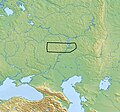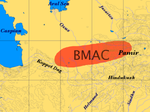Samara culture is regarded as related to contemporaneous or subsequent prehistoric cultures of the Pontic–Caspian steppe, such as the Khvalynsk, Repin...
13 KB (1,337 words) - 19:17, 3 October 2024
Yamnaya culture continues to be debated, with proposals for its origins pointing to both the Khvalynsk and Sredny Stog cultures. The Khvalynsk culture (4700–3800...
68 KB (7,012 words) - 14:21, 25 October 2024
Proto-Indo-European society (redirect from Proto-Indo-European culture)
languages, before the Anatolian split (Cernavodă culture; 4000 BCE); associated with the early Khvalynsk culture, Classic, or "post-Anatolian" (4000–3500),...
78 KB (9,373 words) - 07:05, 21 October 2024
Srubnaya culture in its Srubnaya-Khvalynsk form, which is also called the Late Srubnaya culture, which spread over the territory of the Catacomb culture in...
95 KB (13,137 words) - 20:07, 13 October 2024
uniform, with the Yamnaya culture individuals mainly belonging to R1b-Z2103 with a minority of I2a2, the earlier Khvalynsk culture also with mainly R1b but...
56 KB (6,139 words) - 23:34, 23 October 2024
Bronze Age. Corded Ware culture encompassed a vast area, from the contact zone between the Yamnaya culture and the Corded Ware culture in south Central Europe...
79 KB (9,108 words) - 03:41, 18 October 2024
Europe Copper Age Dnieper–Donets culture History of Ukraine Khvalynsk culture Linear Pottery culture Nebelivka (archaeological site) Neolithic Europe Old Europe...
104 KB (11,331 words) - 20:46, 29 October 2024
Indo-European migrations (category CS1 German-language sources (de))
the diet". The Samara culture (early 5th millennium BCE), north of the Khvalynsk culture, interacted with the Khvalynsk culture, while the archaeological...
267 KB (29,484 words) - 03:49, 28 October 2024
The Bell Beaker culture, also known as the Bell Beaker complex or Bell Beaker phenomenon, is an archaeological culture named after the inverted-bell beaker...
165 KB (19,249 words) - 21:06, 24 October 2024
Celts (redirect from Ancient Celtic culture)
110–. Gimbutas, Marija (25 August 2011). Bronze Age cultures in Central and Eastern Europe. Walter de Gruyter. pp. 100–. ISBN 978-3-1116-6814-7. Milisauskas...
149 KB (16,673 words) - 00:22, 29 October 2024
the contemporaneous Samara culture to the north. Striking similarities with the Khvalynsk culture and the Sredny Stog culture have also been detected. A...
22 KB (2,306 words) - 10:02, 11 April 2024
The Únětice culture, Aunjetitz culture or Unetician culture (Czech: Únětická kultura, German: Aunjetitzer Kultur, Polish: Kultura unietycka, Slovak: Únětická...
78 KB (8,270 words) - 21:08, 24 October 2024
Iron Gates Mesolithic (redirect from Lepenski Vir culture)
Motala#Archaeogenetics Zvejnieki burial ground Deriivka Khvalynsk#Archaeogenetics Samara culture#Genetics Radovanović, Ivana (31 December 2006). "Further...
22 KB (2,594 words) - 00:01, 20 October 2024
The Globular Amphora culture (GAC, German: Kugelamphoren-Kultur (KAK); c. 3400–2800 BC, is an archaeological culture in Central Europe. Marija Gimbutas...
11 KB (1,250 words) - 12:44, 21 October 2024
Kurgan hypothesis (redirect from Kurgan culture)
features. Cultures that Gimbutas considered as part of the "Kurgan culture": Bug–Dniester (6th millennium) Samara (5th millennium) Khvalynsk (5th millennium)...
34 KB (3,818 words) - 02:41, 26 August 2024
The Andronovo culture is a collection of similar local Late Bronze Age cultures that flourished c. 2000–1150 BC, spanning from the southern Urals to the...
63 KB (7,092 words) - 23:43, 31 October 2024
Afanasievo culture, or Afanasevo culture (Afanasevan culture) (Russian: Афанасьевская культура Afanas'yevskaya kul'tura), is an early archaeological culture of...
62 KB (6,056 words) - 17:40, 20 October 2024
Gaels (redirect from Gaelic culture)
languages comprising Irish, Manx and Scottish Gaelic. Gaelic language and culture originated in Ireland, extending to Dál Riata in western Scotland. In antiquity...
94 KB (10,096 words) - 20:24, 22 October 2024
Sarmatians (redirect from Sarmatian culture)
of the Eurasian Steppe, the Sarmatians were part of the wider Scythian cultures. They started migrating westward around the fourth and third centuries...
81 KB (8,705 words) - 19:32, 31 October 2024
the Origins of Vedic Culture: The Indo-Aryan Migration Debate. Oxford University Press. ISBN 0-19-516947-6. CNRS, L'archéologie de la Bactriane ancienne...
59 KB (6,960 words) - 22:14, 28 August 2024
Timber-grave culture, was a Late Bronze Age 1900–1200 BC culture in the eastern part of the Pontic–Caspian steppe. It is a successor of the Yamna culture, the...
16 KB (1,630 words) - 04:49, 24 October 2024
Phrygians (category CS1 German-language sources (de))
Hartapus, Gordis, Muška and the steppe strand in early Phrygian culture" (PDF). Kadmos. 59 (1/2). De Gruyter: 77–128. doi:10.1515/kadmos-2020-0005. S2CID 235451836...
34 KB (4,350 words) - 04:07, 8 August 2024
the Catacomb culture are more frequent than in the Yamnaya culture. Similar horse burials also appeared in the earlier Khvalynsk culture, and in the Poltavka...
28 KB (3,353 words) - 14:11, 20 October 2024
included several cultures in this "Kurgan Culture", including the Samara culture and the Yamna culture, although the Yamna culture (36th–23rd centuries...
236 KB (27,680 words) - 09:00, 6 October 2024
Dacians (redirect from Dacian culture)
Carpi a distinct material culture, "a developed form of the Geto-Dacian La Tene culture", often known as the Poienesti culture, which is characteristic...
124 KB (15,206 words) - 18:43, 20 October 2024
Eastern hunter-gatherer (category Mesolithic cultures of Europe)
agriculturalists. Dnieper-Donets culture Comb Ceramic culture Sredny Stog culture Deriivka Samara culture Khvalynsk culture Lazaridis et al. (2016) found...
43 KB (4,355 words) - 19:46, 14 October 2024
Paleo-Balkan languages (category CS1 German-language sources (de))
2. Walter de Gruyter GmbH & Co KG. pp. 83–113. ISBN 9783110779684. Fortson, Benjamin Wynn IV (2010). Indo-European Language and Culture: An Introduction...
35 KB (3,822 words) - 22:59, 14 October 2024
Cimmerians (redirect from Kimmerian culture)
other early nomadic cultures of the Eurasian steppe and forest steppe which existed before the 7th century BC, such as the Aržan culture, so that these various...
169 KB (20,507 words) - 02:58, 27 October 2024
Illyrians (category CS1 German-language sources (de))
Bela Crkva culture. During the developed Middle Bronze Age, Belotić Bela Crkva which has been recognized as another Proto-Illyrian culture developed in...
122 KB (14,730 words) - 19:17, 30 October 2024
Scythians (category CS1 German-language sources (de))
SCYTHIANS Pazyryk culture Khotan Uyuk culture Tagar culture Massagetae Kangju Subeshi culture Ordos culture Sargat culture Tasmola culture Sauromatians Dahae...
439 KB (53,521 words) - 02:38, 23 October 2024


























